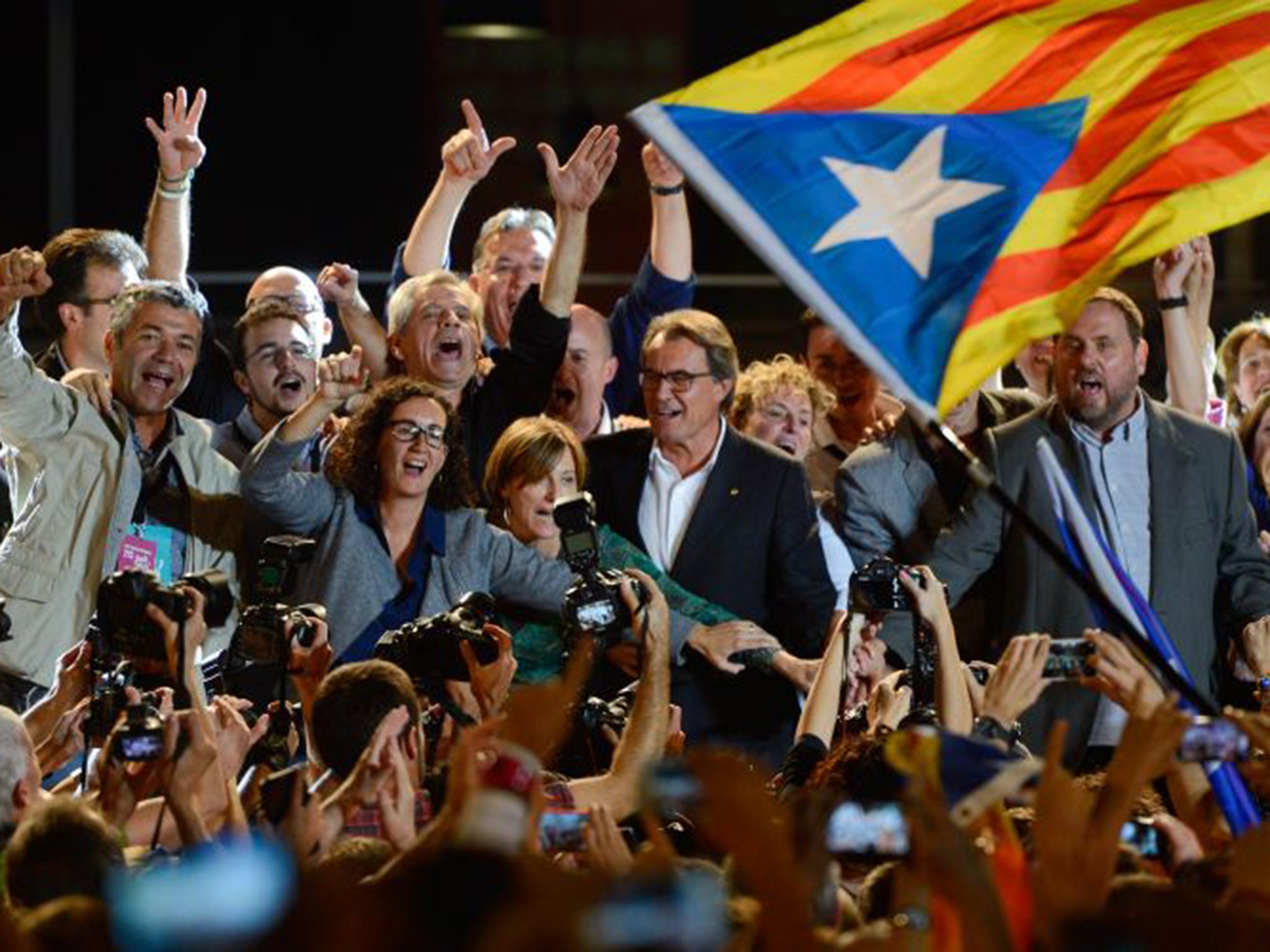Catalonia independence: 'Social disobedience' on the cards in Spain as cracks show in left-right alliance
While separatists claimed a mandate for a vote on independence, Spain’s Prime Minister mocked the result, saying that only 40 per cent of voters had backed self-determination. Alasdair Fotheringham reports from Barcelona

Spain’s Prime Minister, Mariano Rajoy, poured scorn on Catalan separatists’ claims to have won a mandate for moves towards independence yesterday, declaring: “Not even four out of every 10 Catalans are in favour.”
Hours after separatist parties won a majority of seats in the regional election and called on the Spanish government to accept a referendum on independence, Mr Rajoy offered “dialogue”, but said the election result showed that independence “does not have society’s support”.
He urged a new Catalan regional government – which has yet to be formed from among the victorious parties – to “overcome divisions and tension” and “replace unilateral impositions with constructive dialogue”.
Many subjects could be discussed, he added, “but while I am the president of the government, I will not discuss the unity of Spain, the national sovereignty or the freedom of all Spaniards. I am ready to listen but I am not ready to get rid of the law.”
The separatist coalition Junts pel Sí (Together for Yes) and the pro-independence CUP party won 72 of the Catalan Parliament’s 135 seats between them. But under the region’s weighted voting system, that majority of seats was gained with only 47.85 per cent of the votes – and representing 36.8 per cent of the electorate.
Artur Mas, leader of Junts pel Sí, insisted he and his allies now had the required “democratic mandate to create the state of Catalonia”. He added: “We will work to form a broad-based government that leads to the independence of Catalonia.”
Members of the hard-left CUP party – which won seats at the expense of Mr Mas’s own CDC – were jubilant at the result. Soon after polls closed on Sunday, Antonio Baños, a leading member of the party, tweeted: “Without any resentment – Goodbye Spain.” Anna Gabriel, CUP’s deputy leader, said the party would now consider “specific social disobedience [at] specific laws that go against Catalonia’s social and economic interests”.
However, before the election, some separatists had promised that if they failed to secure a majority of votes, they would slow down their drive towards a possible unilateral declaration of independence. Meanwhile Mr Mas, who was Catalonia’s president before the election, now depends on CUP support in parliament to be re-elected as the region’s leader – and faces an uphill task in getting this, since the party won seats by outflanking Mr Mas with a strongly anti-austerity platform.
Except for its desire to form a separate Catalan state, CUP has little in common with Mr Mas and his coalition allies in Junts pel Sí, and is more akin to the radical Greek party, Syriza. Yesterday, its lack of enthusiasm for Mr Mas to lead Catalonia out of Spain showed no sign of abating.
“The process [of gaining independence] is not [about] one person and nobody is indispensable,” said Ms Gabriel,
Mr Mas, on the other hand, shows no sign of wanting to step aside. “One of Junts pel Sí’s agreements is that I will be proposed as president of Catalonia. There is nothing more to say.”
CUP’s more radical anti-capitalist stance, and quite possibly its wariness in dealing with Mr Mas, helped garner strong support in the election, with the party’s haul of seats in the regional parliament rising from three to 10.
Greece elections 2015: In pictures
Show all 25Its hard-left leader, David Fernandez, is well-known for delivering fiery speeches while sporting one of his many T-shirts – reportedly around 200 – bearing radical slogans. Repeatedly rated as Catalonia’s most popular politician, Mr Fernandez has said he would welcome an exit from the EU – one of the supposed down-sides of independence – which he views as being ruled by capitalists “and bankers in ties” bent on exploiting the working class.
Meanwhile, Spain’s former Prime Minister, Jose María Aznar, made clear that he considered the Catalan election results, in which Spain’s governing Popular Party lost nearly half its own seats in the region, augured badly for Mr Rajoy ahead of the expected December general election.
“This is the worst scenario possible,” warned Mr Aznar. “The secessionists are going to continue the [pro-independence] drive.” Referring to previous electoral setbacks for the PP, Mr Aznar said: “It is another warning.”
Weeks of intense negotiations between the different pro-independence forces are therefore likely as they hammer out a route map for breaking away from Spain and agreements on exactly who will be Catalonia’s next president.
Subscribe to Independent Premium to bookmark this article
Want to bookmark your favourite articles and stories to read or reference later? Start your Independent Premium subscription today.

Join our commenting forum
Join thought-provoking conversations, follow other Independent readers and see their replies